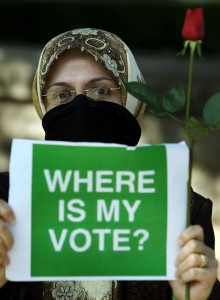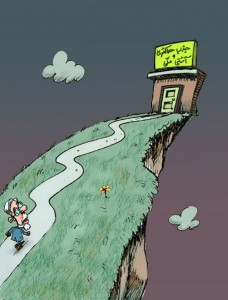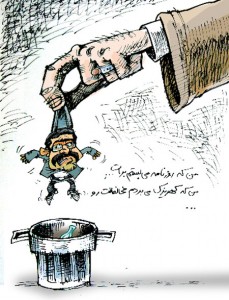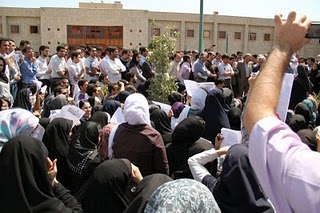The Latest from Iran (31 August): Unity? What Unity?
 Tuesday, August 31, 2010 at 11:05
Tuesday, August 31, 2010 at 11:05  2005 GMT: Execution (Stoning) Watch. The Los Angeles Times, citing Human Rights Activists News Agency, reports that Iranian courts have handed down two more sentences of death by stoning for adultery. The verdict was issued on Saturday to Vali Janfeshani and Sariyeh Ebadi, convicted of having an extramarital affair.
2005 GMT: Execution (Stoning) Watch. The Los Angeles Times, citing Human Rights Activists News Agency, reports that Iranian courts have handed down two more sentences of death by stoning for adultery. The verdict was issued on Saturday to Vali Janfeshani and Sariyeh Ebadi, convicted of having an extramarital affair.The developments follows international protests over the death sentence given to Sakineh Mohammadi Ashtiani for adultery. Ashtiani's execution by stoning has been suspended by Iranian authorities, although there has been no clemency over capital punishment.
1905 GMT: Economy Watch. Deutsche Welle offers an article on the growing economic influence of the Revolutionary Guard, "Iran's largest employer".
1855 GMT: Karroubi, Qods Day, and A Nervous Government. James Miller, at Dissected News, offers a concise overview of latest developments from the "siege" of the Karroubi house to the Government's stumbling propaganda ahead of Qods Day this Friday.
NEW Iran: Ahmadinejad's Trash Talk (Theodoulou)
NEW Iran Witness: Activist Mahboubeh Karami on Six Months in Detention
NEW Iran: The Latest on the Karroubi “Siege” and the Qods Day Rally
Iran: The Regime Feels the Pressure on Stoning
Iran Special: Political Prisoners, Election Fraud, & The Regime’s Backfiring Propaganda
Iran Breaking: Karroubi on Election Fraud; House Surrounded by Pro-Regime Crowd
The Latest from Iran (30 August): Khamenei Slaps Down Ahmadinejad
1640 GMT: MediaWatch. Arshama3's Blog has posted a useful list of websites for Iran news and analysis.
1635 GMT: The Protests Are Not Over (Says the Regime). Ali Fazli, commander of the Basij militia, has said that last year's fitna (sedition) is like fire under the ashes; "when we let it go loose, it will start again".
Minister of Intelligence Heydar Moslehi explains: from 1991-2010 Iran's enemies have spent $17 billion to topple the regime through "soft war", with the money handed over by several foreign embassies in Iran, European parties, "Western" foreign ministries, US-connected Iranian organisations, and dozens of foundations.
(If you're in one of these locations, you could be in for some money from "US Bureaus", according to Moslehi: Baku in Azerbaijan, Frankfurt, London, Istanbul, and Dubai.)
1630 GMT: We have updated on the "siege" of Mehdi Karroubi's house by a pro-regime crowd with an interview with Karroubi's wife Fatemeh Karroubi.
1400 GMT: Political Prisoner Watch. A bit of a twist with the arrest of Hamid Hassanzadeh, President of the Council of Ahwaz....
Hassanzadeh, whose home was raided and whose belongings and computer were seized, is not a Green or a reformist. He was the Ahwaz campaign manager for the conservative Mohsen Rezaei in the 2009 Presidential election.
1330 GMT: Political Prisoner Watch. Kurdish detainee Rahim Rashi has ended his hunger strike after 43 days.
1320 GMT: Parliament v. President (cont. --- see 1310 GMT). From the reformist wing, Qodratollah Alikhani has said, that as the government refuses to allocate funds for the Tehran Metro, it also obstructs other laws, as workers go without pay. Alikhani also criticised Minister of Science Kamran Daneshjoo for his statement warning of "flattening" universities that do not adhere to Islam.
Dariush Ghanbari said he was concerned about new restrictions on the press, suggesting that the Minister of Culture and Islamic Guidance should be summoned to Majlis. Ghanbari made the sharp comment that the dispute over the Family Protection Bill, now sent back to committee, obscured critical issues such as control of inflation and unemployment and stimulation of economic growth.
Meanwhile, MP Mohammad Khoshchehreh has made a conciliatory statement by claiming that the common base of conservatives and reformers is revolutionary principles and anti-imperialism, and any movement to overcome divisions is important.
Which gives us the excuse to publish this not-so-conciliatory photograph of another MP, Mehdi Kouchakzadeh, and Ali Larijani (hat tip Tehran Bureau from Mehr):
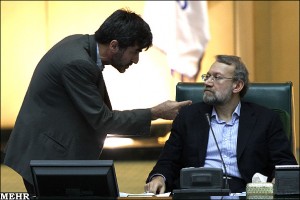
1310 GMT: Parliament v. President. Almost two weeks since the Supreme Leader's intervention, let's see how the call for unity is faring....
The President's spokesman Ali Akbar Javanfekr has accused the Majlis of "misunderstanding laws" and "making laws against Constitution", leading to dictatorial behaviour.
On the other side, key member of Parliament (and ally of Speaker Ali Larijani) has denounced Ahmadinejad's "rowdy" statements. Another member of the critical bloc, Ali Motahari, says the government is fleeing from laws and has established a "half-suffocating" situation: "Ahmadinejad refusing to implement laws is a sign of dictatorship."
Expediency Council member Dorri Najafabadi insists that laws approved by the Council are laws of the Islamic Republic and complains that Ahmadinejad is "not too friendly". Fellow Council member Mohammad Hashemi declares that the government is not the interpreter but executor of laws.
Leading conservative Morteza Nabavi has repeated his criticism that the President has been absent from Expediency Council meetings, saying the Supreme Leader expects Ahmadinejad to attend.
And in an intriguing statement, Habibollah Asgarowladi, leader of the Islamic Coalition Party, says that a principlism with former President Hashemi Rafsanjani on one side and Ahmadinejad on the other is "not desirable".
1240 GMT: Political Prisoner Watch. Heidi Hautala, the head of the European Parliament's Human Rights Commission, has called for the immediate release of activist Shiva Nazar Ahari.
Ahari has been detained since July 2009. She is due in court on 4 September, reportedly to face charges that include "mohareb" (war against God), which carries the death penalty.
Intellectuals, academics, activists, and family members have issued a statement calling for the freeing of Azeri political prisoners.
1110 GMT: The Battle Within. Monavar Khalaj of the Financial Times is on the case with "Iran's Warring Factions Reignite Tensions": "Iran’s radical and conservative fundamentalists have ignored the orders of the regime’s supreme leader and begun exchanging recriminations once again."
1105 GMT: Political Prisoner Watch. The court hearing for Emad Bahovar, a member of the reformist Freedom Movement of Iran and of Research Supporting Khatami and Mousavi, has been postponed again.
Bahovar has been detained since March.
1100 GMT: All the President's Men. Of Iran's 290 members of Parliament, 216 have signed a statement supporting the suspension of Presidential aide and former Tehran Prosecutor General Saeed Mortazavi, ordered by the judiciary because of Mortazavi's alleged complicity in the post-election abuses at Kahrizsak, and hoped for a quick end to the case.
1034 GMT: The Supreme Leader Slaps Down Ahmadinejad. The website of Ayatollah Khamenei has published the English summary of his Monday meeting with the President and the Cabinet, including the rebuke of Ahmadinejad for carrying out a parallel foreign policy.
However, Khamenei has offered public support for the Government subsidy reduction plan.
1030 GMT: Execution (Ashtiani) Watch. The members of Parliament of Portugal's ruling party have joined the call for clemency for Sakineh Mohammadi Ashtiani, sentenced to death for adultery.
1015 GMT: It's All About Me. I would not dare to call the President's Chief of Staff, Esfandiar Rahim-Mashai, self-centered; however, for the record, here is the banner from his personal website:

1010 GMT: Endorsing the Supreme Leader's Slapdown of the President. The Iranian Foreign Ministry, given cover by Ayatollah Khamenei's criticism of Mahmoud Ahmadinejad on Monday, has said that it is essential to avoid "parallel work" in foreign policy.
Last week Ahmadinejad appointed four special representatives for international affairs.
1000 GMT: We have posted a separate feature, written by Michael Theodoulou, on the language being used by Mahmoud Ahmadinejad and Iranian media about internal and international disputes, "Ahmadinejad's Trash Talk".
Already there have been further developments. The Iranian Foreign Ministry has said that it does not agree with insulting another country's officials and specifically denounced the description, offered by Keyhan, of French President Nicolas Sarkozy's wife Carla Bruni as a "prostitute".
Keyhan, however, does not seem to be listening. Today it wrote, "Studying Carla Bruni's record clearly shows the reason why this immoral woman is backing an Iranian woman who has been condemned to
death for committing adultery and being accomplice in her husband's murder and, in fact, she herself deserves to die."
Bruni had spoken out for Sakineh Mohammadi Ashtiani, the Iranian woman sentenced to death for adultery.
0850 GMT: We have posted an interview with women's right activist Mahboubeh Karami, freed on bail this month but facing a four-month prison sentence, about her six months in detention.
0710 GMT: Shutting Down Information. A reader's comment to Tehran Bureau says that the site is now blocked in Iran.
0700 GMT: Political Prisoner Watch. Reports say Arjang Davoudi, on Day 49 of his hunger strike, is in a coma. Davoudi, a poet and teacher, is detained in Gohardasht Prison.
The detention order for blogger Hossein Ronaghi (Babak Khoramdin), who has been imprisoned for 10 months, has been extended for another month. He is reportedly being held in solitary confinement.
0655 GMT: Execution Watch. For days now, we have followed stories on the Internet that hundreds of prisoners have been put to death in Mashhad. Rah-e-Sabz is now posting the claim.
0650 GMT: In a separate entry, we post the latest on the "siege" of Mehdi Karroubi's house and, via a Deutsche Welle interview with his son Hossein, his declaration that he will not be prevented from rallying on Qods Day this Friday.
0600 GMT: A busy, tense, and dramatic Monday --- from the surrounding of Mehdi Karroubi's house by a pro-regime crowd to the Supreme Leader's slap-down of Mahmoud Ahmadinejad to uncertainty in the Iranian establishment over its image on the stoning issue --- and today offers the prospect of more.
Khamanei Slaps Down the President on Foreign Policy
Very cute (and telling?) approach by Press TV to the Supreme Leader's criticism of Ahmadinejad in a meeting with the President and the Cabinet's. The website does note, from Khamenei's official website, the Leader's statement that "Iran's Foreign Ministry is in charge of leading all matters related to the country's foreign policies and affairs".
What Press can't bring itself to say is the rest of the Supreme Leader's rebuke, where he denounced "parallel" structures for foreign policy. That, of course, refers to Ahmadinejad's appointment last week of four special representatives for international affairs.
Indeed, the Press headline is all happiness: "Leader praises Govt. 'Diplomatic Spirit"
 Ahmad Tavakoli,
Ahmad Tavakoli,  Ali Akbar Javanfekr,
Ali Akbar Javanfekr,  Ali Larijani,
Ali Larijani,  Ali Motahari,
Ali Motahari,  Arjang Davoudi,
Arjang Davoudi,  Arshama3's Blog,
Arshama3's Blog,  Ayatollah Ali Khamenei,
Ayatollah Ali Khamenei,  Babak Khoramdin,
Babak Khoramdin,  Carla Bruni,
Carla Bruni,  Dariush Ghanbari,
Dariush Ghanbari,  Deutsche Welle,
Deutsche Welle,  Dissected News,
Dissected News,  Dorri Najafabadi,
Dorri Najafabadi,  Emad Bahovar,
Emad Bahovar,  Fatemeh Karroubi,
Fatemeh Karroubi,  Financial Times,
Financial Times,  Habibollah Asgarowladi,
Habibollah Asgarowladi,  Hamid Hassanzadeh,
Hamid Hassanzadeh,  Hashemi Rafsanjani,
Hashemi Rafsanjani,  Heidi Houtala,
Heidi Houtala,  Heydar Moslehi,
Heydar Moslehi,  Hossein Karroubi,
Hossein Karroubi,  Hossein Ronaghi,
Hossein Ronaghi,  Human Rights Activists News Agency,
Human Rights Activists News Agency,  Iran,
Iran,  Islamic Revolution Guards Corps,
Islamic Revolution Guards Corps,  James Miller,
James Miller,  Kahrizak Prison,
Kahrizak Prison,  Keyhan,
Keyhan,  Los Angeles Times,
Los Angeles Times,  Mahmoud Ahmadinejad,
Mahmoud Ahmadinejad,  Mehdi Karroubi,
Mehdi Karroubi,  Mehdi Kouchakzadeh,
Mehdi Kouchakzadeh,  Mohammad Hashemi,
Mohammad Hashemi,  Mohammad Khoshchehreh,
Mohammad Khoshchehreh,  Mohsen Rezaei,
Mohsen Rezaei,  Monavar Khalaj,
Monavar Khalaj,  Nicolas Sarkozy,
Nicolas Sarkozy,  Portugal,
Portugal,  Press TV,
Press TV,  Qodratollah Alikhani,
Qodratollah Alikhani,  Rah-e-Sabz,
Rah-e-Sabz,  Rahim Rashi,
Rahim Rashi,  Saeed Mortazavi,
Saeed Mortazavi,  Sakineh Mohammadi-Ashtiani,
Sakineh Mohammadi-Ashtiani,  Shiva Nazar Ahari,
Shiva Nazar Ahari,  Tehran Bureau in
Tehran Bureau in  Middle East & Iran
Middle East & Iran 
